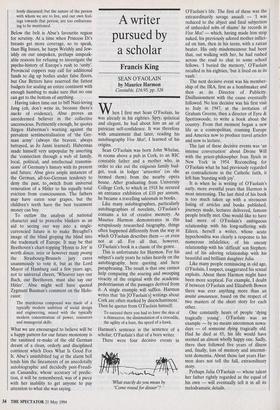A writer pursued by a scholar
Francis King
SEAN O'FAOLAIN by Maurice Harmon Constable, £16.95, pp. 326 When I first met Sean O'Faolain, he was already in his eighties. Spry, quizzical and elegant, he had about him an air of patrician self-confidence. It was therefore with amazement that later, reading his autobiography Vive Moil, I learned of his origins.
Sean O'Faolain was born John Whelan, in rooms above a pub in Cork, to an RIC constable father and a mother who, in order to eke out the exiguous family bud- get, took in lodger `arteestes' (as she termed them) from the nearby opera house. After graduating from University College Cork, to which in 1918 he secured an entrance exhibition of DO per annum, he became a travelling salesmah in books.
Like many autobiographies, particularly autobiographies of novelists, O'Faolain's contains a lot of creative memory. As Maurice Harmon demonstrates in this scrupulously researched biography, things often happened differently from the way in which O'Faolain describes them — or even not at all. For all that, however, O'Faolain's book is a classic of the genre.
This is unfortunate for Harmon. For his subject's early years he relies heavily on the autobiography, here quoting and here paraphrasing. The result is that one cannot help comparing the soaring and swooping vivacity of the original with the academic pedestrianism of the passages derived from it. A single example will suffice. Harmon writes that 'his [O'Faolain's] writings about Cork are often marked by disenchantment.' Then he quotes from O'Faolain himself:
To succeed there you had to have the skin of a rhinoceros, the dissimulation of a crocodile, the agility of a hare, the speed of a hawk.
Harmon's sentence is the sentence of a scholar; O'Faolain's that of a born writer. There were four decisive events in 'What exactly do you mean by "Come round for dinner"? ' O'Faolain's life. The first of these was the extraordinarily savage assault — `I was reduced to the abject and final subjection of unheeded sobs of shame' he records in Vive Moll — which, having made him strip naked, his previously adored mother inflict- ed on him, then in his teens, with a rattan beater. His only misdemeanour had been that, out walking with her, he had rushed across the road to chat to some school fellows. 'I buried the memory,' O'Faolain recalled in his eighties, 'but it lived on in its vault.'
The next decisive event was his member- ship of the IRA, first as a bombmaker and then as its Director of Publicity. Disillusionment with the cause eventually followed. No less decisive was his first visit to Italy in 1947, at the invitation of Graham Greene, then a director of Eyre & Spottiswoode, to write a book about the country. From that moment began a new life as a cosmopolitan, roaming Europe and America now to produce travel articles and now to lecture.
The last of these decisive events was 'an intense conversation' about Divine Will with the priest-philosopher Ivan Ilyich in New York in 1954. Reconciling for O'Faolain what he had previously regarded as contradictions in the Catholic faith, it left him 'bursting with joy'.
It is when he is writing of O'Faolain's early, more eventful years that Harmon is most interesting. The last third of his book is too much taken up with a strenuous listing of articles and books published, Journeys made, lectures delivered, famous people briefly met. One would like to have had more of O'Faolain's ambiguous relationship with his long-suffering wife Eileen, herself a writer, whose acute hypochondria was clearly a response to his numerous infidelities; of his uneasy relationship with his 'difficult' son Stephen; and of his adoring relationship with his beautiful and brilliant daughter Julia.
Like many people reminiscing in old age, O'Faolain, I suspect, exaggerated his sexual exploits. About them Harmon might have been more sceptical. For example, I doubt if between O'Faolain and Elizabeth Bowen there was ever anything more than an amitie amoureuse, based on the respect of two masters of the short story for each other.
One constantly hears of people 'dying tragically young'. O'Faolain was an example — by no means uncommon nowa- days — of someone dying tragically old. Had he died at 85, his life would have seemed an almost wholly happy one. Sadly, there then followed five years of illness and, finally, loss of memory and intermit- tent dementia. About those last years Har- mon does not tell the full, extraordinary story.
Perhaps Julia O'Faolain — whose talent her father rightly regarded as the equal of his own — will eventually tell it in all its melodramatic details.




































































 Previous page
Previous page